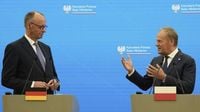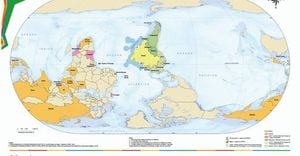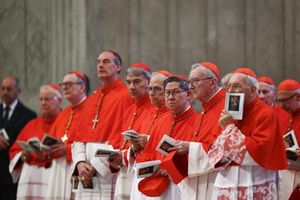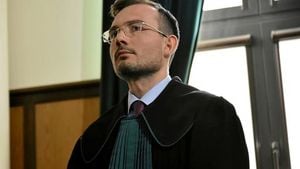On May 7, 2025, Chancellor Friedrich Merz of Germany embarked on a significant diplomatic mission, visiting both Paris and Warsaw in his inaugural trip as the head of government. However, his arrival in Poland was marked by tension rather than warm welcomes.
Polish Prime Minister Donald Tusk did not mince words when addressing the planned migration policies of the new German government. "Germany will let into its territory whom it wants. Poland will only let in those whom it accepts," Tusk stated, highlighting the friction between the two nations regarding migration issues. This statement came during Merz's official visit, where disagreements were palpable from the outset.
Tusk's criticism was particularly directed at the establishment of the "Dublin Center" in Eisenhüttenstadt, located near the Polish border. This center is designed to facilitate the quicker return of asylum seekers to other EU states, with a focus on transferring migrants back to Poland. Tusk emphasized that it should not be implied or assumed that Germany could send specific groups of migrants to Poland without mutual agreement.
In addition to addressing the Dublin Center, Tusk expressed his firm opposition to Merz's plans to tighten border controls. He warned, "If someone introduces controls at the Polish border, Poland will also introduce such controls. And that simply doesn’t make sense in the long term." Tusk stressed that Poland has shouldered a significant burden in guarding the EU's external borders, particularly in light of the ongoing migrant crisis exacerbated by the Belarusian regime, which has been accused of orchestrating the influx of migrants into the EU.
During the press conference, Merz acknowledged Poland's efforts to secure the EU's external borders and promised support. "We feel it as an obligation to better protect these European external borders with German support and assistance than we have managed in the past," he stated. Merz also underscored the importance of finding "good solutions" together, reflecting a desire for cooperation rather than confrontation.
However, Merz's commitment to increased border controls in Germany raised eyebrows. He defended these measures as necessary, while simultaneously affirming his dedication to the Schengen Agreement, which allows for free movement within the EU. He remarked, "The small border traffic is an important factor for jobs and prosperity, and therefore the free movement of people in the EU is a common interest."
In a further display of cooperation, Merz emphasized the need for a pan-European approach to migration, stating, "We will carry out border controls in a manner that is compatible for our European neighbors." He indicated that discussions with German Interior Minister Alexander Dobrindt would focus on maintaining communication with neighboring countries regarding these controls.
In a significant moment during the visit, Merz also announced plans to erect a monument in Warsaw to commemorate the city's occupation during World War II, indicating a commitment to historical reconciliation. He expressed the intent to establish a temporary memorial until the permanent structure is completed.
Despite the diplomatic overtures, Tusk remained firm on Poland's stance regarding asylum seekers. He stated that Poland would not accept deportations of asylum seekers back to its territory and warned that sending asylum seekers back and forth across borders would lead to chaos. He called for a longer-term perspective on migration policy and highlighted the ongoing situation in Ukraine, urging Germany and Poland to maintain support for Ukraine against Russian aggression.
The tensions between the two nations over migration policies are not isolated to bilateral discussions. Switzerland has also voiced concerns regarding Germany's migration plans. Swiss Justice and Police Minister Beat Jans criticized the systematic rejections at the border, stating that they violate existing laws and expressing disappointment that Germany implemented these measures without prior consultation. The Swiss authorities are monitoring the situation closely and may consider further actions if necessary, while also emphasizing the need to ensure that cross-border travel remains unaffected.
In the context of the ongoing discussions, it is essential to note that both the Union and the SPD parties in Germany have agreed in their coalition contract to maintain border controls and the rejection of asylum seekers, but this must be done in coordination with European neighbors. This aspect of the agreement highlights the complexity of the situation, as the SPD has stipulated that the consent of affected countries is necessary for such measures, a point that Union representatives have contested.
As the discussions continue, the focus remains on finding a balanced approach that respects the rights of migrants while addressing the legitimate concerns of border security. Both Merz and Tusk have emphasized the need for cooperation and mutual respect in managing migration and border policies, but their differing perspectives underscore the challenges ahead.
In summary, the inaugural visit of Chancellor Merz to Poland has opened a crucial dialogue on migration policies, revealing the complexities of European cooperation in this area. With both leaders expressing a desire for collaboration, the path forward will require careful negotiation and a commitment to shared responsibilities in managing migration across borders.




